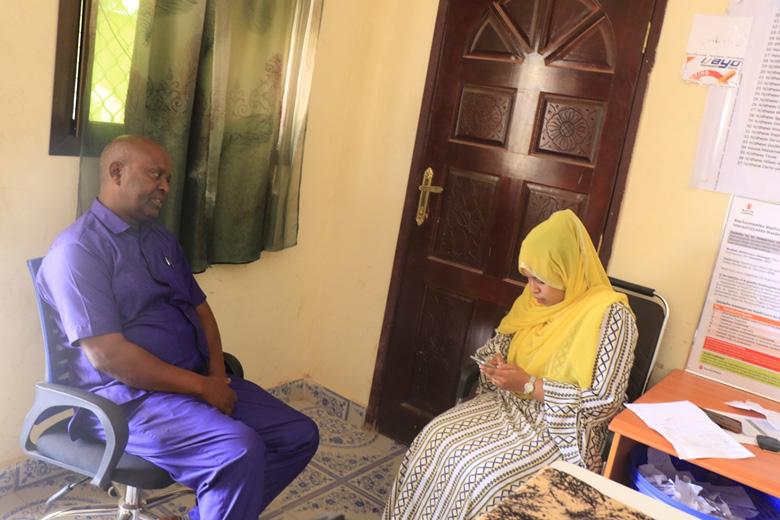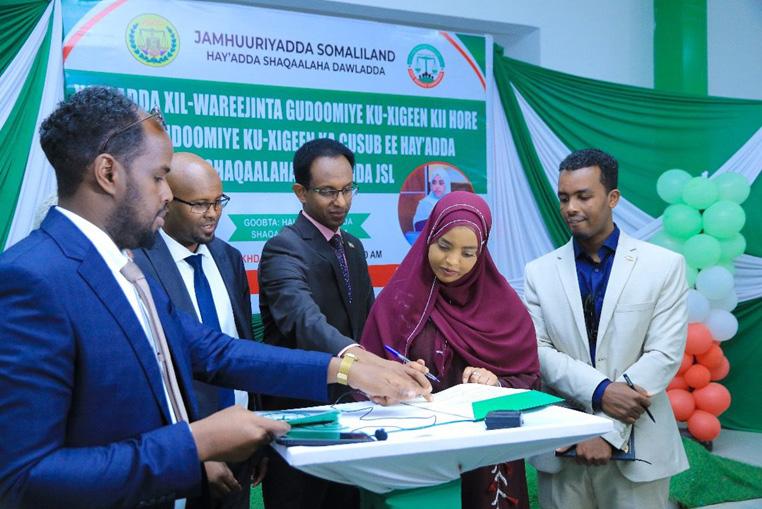
5 minute read
Main Findings of the Public Sector
Main Findings of the Public Sector Service Delivery Survey
The Civil Service Strengthening Project, implemented by the Government of Somaliland with support from the World Bank, seeks to strengthen basic functions for payroll, human resources, and policy management in selected central agencies and line ministries in order to improve service provision across Somaliland. To inform this project, research was undertaken to understand perceptions of public sector performance, including efficiency, quality, accessibility, and integrity; knowledge of the ongoing public sector reform; current performance of the public sector in delivering ten key public services; and actual practices in the public sector. This research will help inform project work to improve leadership and service delivery rendered to the public, including through the subsequent monitoring of indicators developed at baseline in future evaluations. Monitoring team member taking notes from enumerator and household interviewee In general, many respondents had not successfully received government services since the beginning of 2020. This is a notable finding, as it suggests a general need to improve the accessibility of government services, particularly in rural and remote regions (especially Sanaag and Sool) where rates of service provision were low. Education and health services were the most frequently received services by the general public. The business community was not surveyed about these services because they do not directly relate to the operations of businesses. For education services, the general public and civil servants rated the efficiency and quality of the service as somewhat satisfactory. Accessibility—and in particular, affordability—was rated lower by both groups, particularly by civil servants. However, respondents stated that all three dimensions had, on average, improved a little over the past three years. Response patterns for health services were very similar, with efficiency and quality rated as somewhat satisfactory but lower ratings for accessibility, particularly affordability. It is noted also that in qualitative interviews, respondents from the Ministry of Health noted that unqualified doctors or health professionals could pose a risk to the quality of health services. Taxation services were also received by a relatively large number of respondents. The general public, business owners, and civil servants all rated efficiency and quality as somewhat satisfactory and stated that they had improved either a little or a lot over the
Advertisement
Monitoring team member taking notes from enumerator and household interviewee
past three years. Businesses and civil servants, however, rated accessibility of taxation services less highly. The main barriers reducing accessibility to tax services included insufficient information, hard-to-reach office locations, and the absence of staff. For justice-related services, the business community rated efficiency and quality lower, on average, than the general public and civil servants, who rated these dimensions as somewhat satisfactory. This may be because the complexity of cases faced by businesses is higher than the general public, or because there is insufficient outreach to businesses by the relevant ministries. Additionally, we note relatively lower ratings for the physical accessibility (location) of justice services, with, for example, around one-quarter of public respondents stating that justice institutions were hard to reach and with substantial travel times reported to reach institutions. On average, businesses tended to rate the land-related services provided by the Ministry of Public Works more favorably than the general public. All three groups, civil servants, businesses and the public noted either a little improvement or a lot of improvement in efficiency, quality and accessibility over the last three years. The main reasons attributed for inefficiencies and low quality were incompetent staff and poor infrastructure. Additionally, land services were often reported to be unaffordable. Sample sizes for road-related services, animal production services, and environmental protection services were low, reducing our ability to draw robust conclusions about these services. However, we find that civil servants generally rated the efficiency and quality of roadrelated services quite highly, with lower ratings for accessibility. We also note that for road services, a large portion of respondents did not successfully receive the service despite requesting it. For animal production services, the general public rated services much more highly than businesses or civil servants; civil servants rated the accessibility of these services particularly lowly. For environmental protection services, civil servants similarly rated the accessibility of these services as the most pressing issue to improve provision of the service (in line with the small number of respondents who had received these services). Across the general public and businesses, perceptions of the efficiency and quality of agricultural support services were generally high (although few businesses had successfully received these services). Perceptions of accessibility were lower; additionally, civil servants had lower perceptions of the service’s efficiency, quality, and accessibility than the public or businesses. Notably, high specialist fees, followed by the expectation of unofficial payments to reduce waiting time, were seen as major factors undermining the affordability of agricultural services. Lastly, businesses and civil servants reported similar perceptions of efficiency and quality of business licensingrelated services, rating them as somewhat satisfactory. Business respondents had higher perceptions of the accessibility of the service than civil servants, with the exception of the financial aspect, which 50% of respondents believed was restrictive. Full report of this survey is expected to be out by the end of January 2022 and will be available for public by then.
Enumerator interviewing a Civil servant at Gabiley region


President Appoints New Civil Service Commission Deputy Chairperson
The President of Somaliland appointed Amina Hussien Mohamoud as the new Deputy Chairperson for the Civil Service Commission. This is the first time in the history, a women is appointed in this position which gives a unique status to the deputy chairperson and to the institution as a whole. In a well-organized event at the Civil Service Commission office, a handover ceremony took place where the former deputy officially handed over to the new deputy attended by CSC staff and other government officials. Ms. Amina, thanked the event organizers and the CSC management for the event and said she will contribute her experience and knowledge to the overall goal of the civil service making sure the commission achieves its national goals as intended. At the end of the event, the CSC Chairman acknowledged the former deputy’s well regarded contribution to the commission and hoped the new deputy to continue from there highlighting her past experience in the civil service policies and guidelines since she has been closely working with the commission in her former position at the Ministry of Telecommunication.











